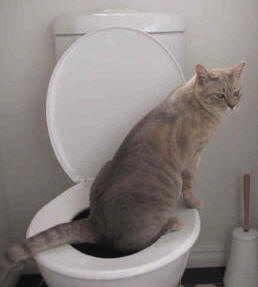Avoid Toilet Disasters: Don't Flush Cat Poop Down Your Toilet - Expert Guidance
Avoid Toilet Disasters: Don't Flush Cat Poop Down Your Toilet - Expert Guidance
Blog Article
Have you been looking for content about Can You Flush Cat Poop Down The Toilet??

Intro
As feline owners, it's vital to be mindful of just how we throw away our feline buddies' waste. While it might seem hassle-free to flush feline poop down the commode, this practice can have destructive consequences for both the atmosphere and human health.
Environmental Impact
Purging pet cat poop introduces damaging virus and bloodsuckers into the supply of water, presenting a substantial threat to marine ecosystems. These contaminants can negatively impact marine life and compromise water quality.
Health Risks
In addition to environmental worries, flushing cat waste can also pose health threats to people. Cat feces may contain Toxoplasma gondii, a parasite that can create toxoplasmosis-- a potentially severe disease, especially for expecting ladies and people with weakened body immune systems.
Alternatives to Flushing
Thankfully, there are safer and much more responsible ways to get rid of cat poop. Consider the adhering to alternatives:
1. Scoop and Dispose in Trash
The most usual method of throwing away feline poop is to scoop it into a biodegradable bag and throw it in the trash. Be sure to utilize a dedicated litter inside story and deal with the waste immediately.
2. Use Biodegradable Litter
Select eco-friendly feline litter made from products such as corn or wheat. These litters are environmentally friendly and can be safely taken care of in the garbage.
3. Hide in the Yard
If you have a backyard, take into consideration hiding pet cat waste in an assigned area away from vegetable yards and water resources. Make sure to dig deep sufficient to prevent contamination of groundwater.
4. Mount a Pet Waste Disposal System
Buy a family pet waste disposal system specifically made for feline waste. These systems use enzymes to break down the waste, lowering odor and ecological influence.
Conclusion
Responsible pet possession expands past supplying food and sanctuary-- it additionally involves correct waste monitoring. By refraining from purging feline poop down the commode and choosing different disposal methods, we can lessen our environmental footprint and secure human health and wellness.
Why Can’t I Flush Cat Poop?
It Spreads a Parasite
Cats are frequently infected with a parasite called toxoplasma gondii. The parasite causes an infection called toxoplasmosis. It is usually harmless to cats. The parasite only uses cat poop as a host for its eggs. Otherwise, the cat’s immune system usually keeps the infection at low enough levels to maintain its own health. But it does not stop the develop of eggs. These eggs are tiny and surprisingly tough. They may survive for a year before they begin to grow. But that’s the problem.
Our wastewater system is not designed to deal with toxoplasmosis eggs. Instead, most eggs will flush from your toilet into sewers and wastewater management plants. After the sewage is treated for many other harmful things in it, it is typically released into local rivers, lakes, or oceans. Here, the toxoplasmosis eggs can find new hosts, including starfish, crabs, otters, and many other wildlife. For many, this is a significant risk to their health. Toxoplasmosis can also end up infecting water sources that are important for agriculture, which means our deer, pigs, and sheep can get infected too.
Is There Risk to Humans?
There can be a risk to human life from flushing cat poop down the toilet. If you do so, the parasites from your cat’s poop can end up in shellfish, game animals, or livestock. If this meat is then served raw or undercooked, the people who eat it can get sick.
In fact, according to the CDC, 40 million people in the United States are infected with toxoplasma gondii. They get it from exposure to infected seafood, or from some kind of cat poop contamination, like drinking from a stream that is contaminated or touching anything that has come into contact with cat poop. That includes just cleaning a cat litter box.
Most people who get infected with these parasites will not develop any symptoms. However, for pregnant women or for those with compromised immune systems, the parasite can cause severe health problems.
How to Handle Cat Poop
The best way to handle cat poop is actually to clean the box more often. The eggs that the parasite sheds will not become active until one to five days after the cat poops. That means that if you clean daily, you’re much less likely to come into direct contact with infectious eggs.
That said, always dispose of cat poop in the garbage and not down the toilet. Wash your hands before and after you clean the litter box, and bring the bag of poop right outside to your garbage bins.
https://trenchlesssolutionsusa.com/why-cant-i-flush-cat-poop/

As a devoted person who reads about Can You Flush Cat Poop Down The Toilet?, I figured sharing that excerpt was worth the trouble. Sharing is caring. You just don't know, you may just be doing someone a favor. Bless you for your time. Kindly pay a visit to our blog back soon.
Request Your Service Report this page